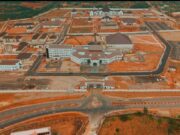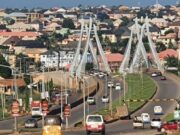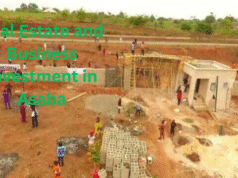March and April 2024 came with many orders and injunctions from the state government. One of the prominent ones was the order to the demolition of building and structures in Onitsha.
While these events led to the loss of investment money for the owners of the demolished building, it’s important to take a step back and observe the reason for this demolition.
Why were whole buildings and market structures leveled to the ground? What did the owners and developers get wrong? What can investors learn from these incidents?
If you’re asking these questions, we are here to help. In this article, we will discuss some lessons you should learn from the building demolition incidents as a real estate investor in Onitsha.
A Backstory: What’s with these building demolitions?
As we pointed out earlier, some buildings were demolished in March and April of 2024 in the state government’s order.
One of the places the governor gave the order to demolish was two four-storey buildings in Amobi Street, Onitsha South. These buildings were supposed to have about 800 shops upon completion, but that was not to be.
As with every building, appropriate authorities were supposed to inspect the building and give their verdict on the strength of the structure. When these officials checked the buildings, they were appalled to find obvious cracks and weak decking.
They then reported back to their office, prompting the buildings to be demolished.
The other incident was the demolition of about 2000 shops on Niger Street, Fegge. What gave rise to such aggressive inspections was the collapse of a property earlier in March which left about 8 people dead and a lot more people injured.
Although the sand miners and traders using the structures said they got their licenses from The National Inland Waterways Authority (NIWA), the governor stressed that the body was not the right authority to get approval from.
And given the environmental impact of such structures situated along the banks of the Niger River, the government thought it wise to demolish the structures for safety reasons.
Best Lessons to Learn as a Real Estate Investor in Anambra
As a real estate investor, here are some lessons from demolition incidents.
1. Adherence to Building Standards and Codes
One important lesson is adhering strictly to building standards and codes. The demolished buildings were found to have structural deficiencies, which underscores the need for proper construction practices.
As an investor, ensure that the construction projects you fund are managed by reputable contractors who follow local building regulations. This not only ensures safety but also protects your investment.
Read Also: How to Authenticate Your Registered Land Survey plan in Anambra
2. Importance of Using Qualified Professionals
The issues that led to the demolitions could have been mitigated by engaging qualified professionals at every stage of the construction process. This includes architects, engineers, and construction managers who are licensed and have a proven track record.
Always work with certified and experienced professionals. Conduct due diligence when hiring contractors and ensure they have a good reputation and a history of successful projects. While this might increase initial costs, it is a worthy investment for the long-term safety and viability of your property.
3. Regular Inspections and Maintenance
Even in the building process, it’s important to inspect the work often. Regular inspections and maintenance can help identify potential structural issues before they become catastrophic.
Schedule periodic inspections by qualified professionals to assess the integrity of your properties. This proactive approach can save money and lives, and preserve your investment.
4. Understand Local Regulations and Compliance
The confusion over the appropriate licensing authority (NIWA vs. state government) in the Fegge demolitions highlights the need to understand local regulations. Although they had licenses from NIWA, this did not substitute the necessary state-level approvals.
Ensure that all necessary permits and approvals are obtained from the correct authorities. Engaging with state-level urban planning bodies and understanding their requirements can prevent future legal and financial repercussions.
5. Environmental Considerations
As a real estate investor, it’s wise to also consider the environmental impact of your projects. The demolished structures on Niger Street were partly because of inappropriate use of land along waterways.
You need to conduct proper environmental assessments to ensure that projects are sustainable and do not violate environmental regulations.
6. Community Engagement and Social Responsibility
Real estate developments impact the community significantly. Engage with local communities to understand their needs and ensure that your projects benefit the area.
This can enhance your reputation and ensure smoother operations. Building trust and good relationships with the community can also provide support in times of dispute or regulatory challenges.
7. Risk Management and Insurance
While we don’t talk about insurance a lot in our climate, the financial losses incurred from the demolitions show the importance of risk management and having appropriate insurance coverage.
Real estate investments are inherently risky, and unforeseen events like government-ordered demolitions can lead to significant financial setbacks. So, develop a risk management strategy that protects your projects against risks, including natural disasters, regulatory changes, and other unforeseen events.
8. Conduct Legal and Financial Due Diligence
Conduct thorough legal and financial due diligence before embarking on any project. This involves checking the legitimacy of land titles, understanding zoning laws, and ensuring there are no legal disputes over the property.
Financial due diligence ensures that the project is viable and that you have the necessary funding to complete it without compromising on quality.
Read Also: What You Need to Know About Anambra State Property Laws
The Way Forward
Real estate investment in Anambra, like any other region, requires meticulous planning, adherence to regulations, and a commitment to quality.
The recent building demolition events in Onitsha serve as a stark reminder of the importance of due diligence and compliance with the right authorities. It also highlights the consequences of neglecting these crucial aspects.
Thankfully, you don’t need to have the experience to learn. You can learn from these incidents by investing wisely, and implementing best practices so you can protect your investments and contribute positively to the region’s development.

















